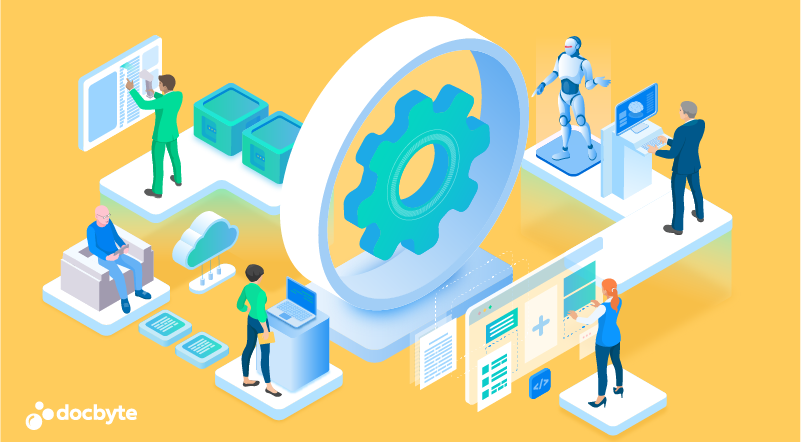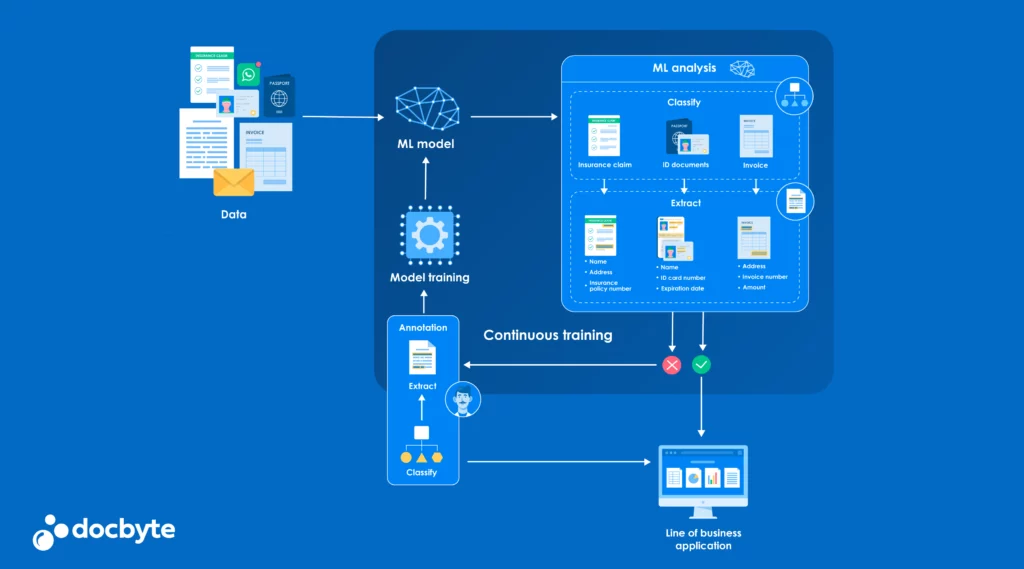Digital technologies have brought about a new era of efficiency and innovation in the ever-changing business landscape. This trend is beyond the simple adoption of technology. It signifies a fundamental change in how companies run, engage with clients, and adjust to a changing market.
Across many industries, digital transformation is becoming a defining factor, changing conventional business models and opening up previously unheard-of development prospects. The article analyzes the complex aspects of digital transformation and clarifies its significant effects on various businesses, organizations, and industries.
By doing this, we can negotiate the complex interactions between technology and industry dynamics and investigate the revolutionary impacts that fundamentally alter how we think about and carry out industrial processes.
The realm of digital transformation is all about introducing agility in industries. The rapid technological advancements, when merged with AI and machine learning, help organizations easily adapt to market changes. This article focuses on five key areas that focus on the impact of digital transformation and how digital transformation is revolutionizing industries.
The Impact of Digital Transformation on Business
Have you ever wondered the digital transformation impact on business? The function of digital technology has changed over time, moving from being a marginal efficiency driver to a force that fosters innovation and disruption in various business operations.
This is a broad transition that offers both substantial risks and chances for value generation. As industries struggle with digitalization’s strategic ramifications, leaders are urged to take on obstacles head-on.
Industrial digital transformation is a strategic decision that can yield benefits like improved operational efficiency, higher revenue, and lower expenses. It’s not just a trend. Organizations can gain a competitive advantage through quick adaptation, setting them up for success in the increasingly digital world.
Operational efficiency, improved customer experience, faster innovation, data use for informed decision-making, and strategic agility are the five main areas of opportunity that stand out. Proactive leadership and a strategic mentality are necessary for successfully managing this transition. Those who welcome change will prosper and survive in the ever-changing digital transformation industry.
1. Digital Transformation: Improving customer engagement
The most crucial area where businesses need to innovate is the way they interact with their customers.
Clients are increasingly demanding when it comes to service and support. These stringent expectations raise the bar in terms of customer interaction and real-time support, calling for a digital relationship.
Customer engagement is a vital aspect of a company’s digital transformation and can be enhanced by:
- Helping customers to understand a company’s offering.
- Providing better digital tools and insights to make better choices.
- Simplifying billings.
- Allowing customers to better interact with customer service.
- Launching new digital touchpoints that improve their experience and are in line with their expectations such as digital customer onboarding process.
2. Ensuring regulatory compliance
By digitizing information, it can be kept up to date and digitally archived, improving document traceability, simplifying facility management, and helping operations to stay compliant.
To make sure nothing slips between the cracks, you digitize at the start of your processes: when documents arrive in your mailroom.
When an incident that requires an official inquiry occurs, a company must be able to produce operating procedures, specifications, and additional information required by regulatory instances.
If not, the company can often face heavy fines. An effective quality management system can help you with this.
Digital documents can be easily tracked and accessed by document controllers and operators, enabling:
- fast and accurate response to regulatory inquiries when needed
- a reduction in future fines
- a reduction on existing fines if information management improvements are made
3. Increasing operations intelligence
The ability to predict asset performance, identify changing conditions, and evaluate investment options is a powerful advantage for businesses.
Digital asset management enables the use of real-time monitoring and data analytics, increasing operations intelligence and allowing operators to handle challenges more effectively.
Moreover, better insights lead to better predictions and decisions in terms of product requirements and customer necessities.
By digitizing asset management, companies can optimize their demand response and increase revenues.
4. Boosting employee productivity
When employees have remote access to real-time information for example, via a digital archive, they can verify that they are performing correctly.
Digital technology can help companies to provide the correct and necessary information to employees, both in the office and on the road, through:
- more effective work requirements,
- enhanced planning and scheduling,
- optimized logistics information.
Information management solutions are key to decreasing the time spent on searching and interpreting ad-hoc information and avoiding unplanned downtime, improving the overall company productivity.
5. Using the advantages of the cloud
Cloud technologies have proven their advantages for the management of company data and to stimulate collaboration between various business teams that are working on large-scale projects.
Instead of using email, FTP sites, USB sticks, or external drives to share information, organizations now see the benefits of sharing information and collaborating through the cloud, saving both time and money.
Digital transformation is not just about knowing what is happening across an organization.
The real value lies in the control, analytics, and predictive response to maximize efficiency, productivity, and customer engagement.
Digital Transformation of Different Industries
Let’s now talk about the impact of digital transformation on business and different industries. The way public services are delivered has been transformed by digital transformation in the government sector. By offering products that simplify document processing and verification, Docbyte plays a crucial part in this evolution.
Adopting digital technology improves accessibility, efficiency, and transparency in the government sector. Let’s break into how does the digital transformation affect organizations at different levels.
1.Impact of Digital Transformation in Government
The government sector has undergone a digital transformation that has revolutionized public service delivery. With new technologies, document classification, processing, and verification have become streamlined processes. The integration of digital platforms in the public sector has not only made it more accessible but also more efficient and transparent.
Government agencies can use digital technology to simplify the applications and registration of various services and programs. This ensures a smooth and easy process for citizens whom bureaucratic procedures may have deterred in the past. Digital technology has become a game-changer in the government sector, creating opportunities for improved public service delivery.
2. Impact of Digital Transformation on the Pharmaceutical Industry
Digital transformation has brought a new era of efficiency and compliance in the pharmaceutical business. The introduction of new solutions has significantly streamlined document management, ensuring that all regulations are adhered to without any discrepancies.
This technological shift has revolutionized the way pharmaceutical companies operate, enabling them to meet strict requirements while still maximizing productivity. The industry has transformed beyond recognition, and business leaders are optimistic that further innovation will continue to bring positive change.
The digital transformation era has brought about a new era of efficiency and compliance in the pharmaceutical business, benefitting both companies and the patients they serve.
3. Impact of Digital Transformation on Insurance Industry
The insurance industry is no stranger to paperwork, and with document-intensive operations, digital transformation is a game-changer. With streamlined claims processing solutions, paperwork is cut down, and client experiences are vastly improved. Document verification is expedited, and accuracy is increased- all thanks to the digitalization of insurance operations.
It’s no secret that paperwork can be tedious, especially regarding insurance claims. Still, with digital transformation, the industry can thrive with greater efficiency – and even happier customers.
4. Impact of Digital Transformation on Manufacturing Industry
The manufacturing sector is currently undergoing a digital revolution that is changing the way production processes are carried out and driving operational efficiency. With the adoption of digital technology, manufacturing firms are improving collaboration amongst their teams, reducing error rates, and increasing overall output.
The optimization of document processing is particularly noteworthy, enabling firms to build a more responsive and nimble production ecosystem. As machine learning, artificial intelligence, and other digital tools become more prevalent in the manufacturing sector, firms can look forward to improved productivity, greater production agility, and a competitive edge in today’s fast-paced economy.
5. Impact of Digital Transformation on Education Industry
The pace of change in the world of education is picking up as digital transformation gathers momentum. Technological advancements in education have enabled education institutions to create dynamic and productive learning environments that prepare students for the future.
The adoption of digital technology in education has also made document processing and verification more efficient, leaving educators with more time to focus on crafting high-quality learning opportunities. By streamlining administrative duties, educators can ensure students receive a top-tier education without distraction.
As we continue to navigate the ever-changing technological landscape, education cannot afford to be left behind, ensuring students receive a world-class education that meets the challenges of our digital world.
6. Impact of Digital Transformation on Finance Industry
Digital transformation has undoubtedly revolutionized the finance sector, presenting new opportunities for financial organizations to keep up with the demands of modern-day customers. One solution Docbyte offers is document management and verification automation, leading to enhanced productivity and compliance in financial processes.
Not only does the adoption of digital technology guarantee increased client happiness, but it also promises higher accuracy and speedier transactions, freeing up time and resources for financial organizations to prioritize customer satisfaction.
By adopting a more flexible and customer-focused approach to financial procedures, organizations can redefine how they operate and thrive in today’s rapidly evolving digital landscape.
7.Impact of Digital Transformation on Healthcare
The healthcare industry has been revolutionized by the advancements in digital technology. With the help of these advancements, patient care has reached a new level of excellence as medical staff can now communicate more efficiently and timely. Additionally, the process of approving important papers has been expedited, making it easier for doctors and patients alike.
Thanks to digital technology, keeping up with changing norms in the field is also much more manageable. With all of these benefits, it’s clear that the digital revolution in healthcare is positively impacting patient care and the healthcare industry as a whole.







